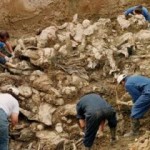Human Bones Found in Kurdish Cities in Turkey
 Kurdistan is a region whose residents have not had the right to choose a long life with natural death for decades.
Kurdistan is a region whose residents have not had the right to choose a long life with natural death for decades.
Kurds have been exposed to numerous crimes against humanity ever since Kurdistan, their country, was divided into four parts and shared by the four states of the Middle East – Turkey, Iraq, Iran and Syria.
Disappearances were very common in the Kurdish region in Turkey in the 1990s during Turkey’s dirty war against the Kurds. For a long time, people were scared of speaking about their loved ones who disappeared as they knew that it would increase their own chances of disappearing.
This week, stories about two disappearances have been covered by the Kurdish media in Turkey.
The first one is from Dersim. The Chief Public Prosecutor’s Office has started an investigation regarding the human bones found in the Hesen Qemer Cave in Laç Valley, a military forbidden zone in the Kurdish province of Dersim.
Hıdır Çelik, a resident in the region, took the journalists to the cave and filed a criminal complaint, claiming that he had lost 30 relatives during the Dersim Genocide.
The prosecutors have reported they will start analyzing the bones and other materials found in the cave in the earliest time.
Another story of disappearance that has recently been disclosed takes place in the Kurdish province of Mardin:
It has been revealed that the bones that were found during an excavation in Qoser in 2008 belonged to 2 brothers, Şemsettin and Nejat Yalçınkaya.
The Katarlı village of Mardin was evacuated due to “security concerns” by the Turkish military between 1993 and 1995. The unidentified murders that took place in the region started to be investigated after the villagers applied to the Mersin Branch of the Human Rights Association (IHD).
IHD demanded the Chief Public Prosecutor’s Office to start conducting excavations in the region. During the excavations, dead bodies of two civilians were found in the water-well of the village but they could not be identified in the DNA test.
The bones were sent to the Institution of Forensic Medicine in Istanbul for further DNA tests and the Institution matched the bones with the blood samples taken from families. At the end of the analysis, it was disclosed that the bones belonged to two brothers, Şemsettin and Nejat Yalçınkaya, who disappeared 18 years ago.
The Prosecutor’s office conducted a second excavation in the village on April 22 and human bones were found again in the water-well which was 11 meters deep.
The prime suspect of the unidentified murders and disappearances in the Kurdish district of Qoser is Colonel Atilla Uğur, who was the gendarme commander of the district of Kızıltepe in that period and imprisoned in the Ergenekon case.
Journalist Daniel Steinvorth wrote about the disappearances in Kurdish cities for SPIEGEL International:
When members of the special Turkish police unit Jitem arrived at night, Kurdish inhabitants of southeast Turkey knew there would be another disappearance. Investigators are now looking into the activities of this allegedly disbanded secretive organization from the 1990s — and the ‘death wells’ where its victims were hidden.
Throughout the 1980s and 1990s, thousands of civil rights activists, politicians and business people suspected of having ties with the PKK were kidnapped and murdered. No one knows their exact number, and it was only in rare cases that the victims were even identified.
Many corpses were dumped into wells; others were doused in acid and thrown into fields. The horror of the sight was meant to serve as a deterrent. But the majority disappeared without a trace and are still listed as missing.
Human rights organizations have repeatedly stated that thousands of Kurds have been subjected to execution-style killings, disappearances, and deaths in custody carried out by state agents in the Kurdish region in Turkey in 1990s.
As Human Rights Watch puts it:
Justice for the thousands of state-perpetrated killings and disappearances of Kurdish civilians in the 1990s should be an essential part of the peace process under way in Turkey.
So if the Turkish authorities are intent on proving their seriousness and sincerity in resolving the Kurdish issue, they should secure the justice for killings and disappearances by state forces or officials in order to help build the foundations of lasting peace.
Comments are closed.